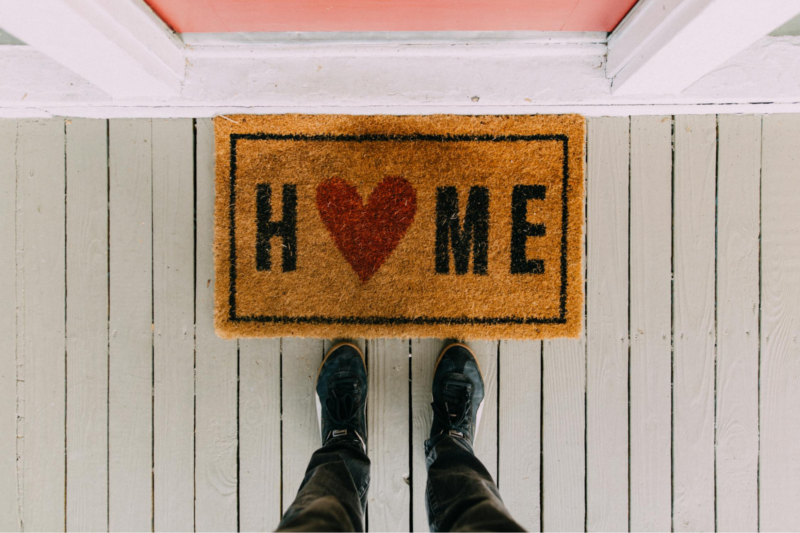Your home should be more than just a place to sleep—it should be a retreat, a space where you can unwind, recharge, and feel completely at ease. A secure home plays a crucial role in mental wellness, offering a sense of peace that allows you to focus on what truly matters. But security isn’t just about alarm systems and deadbolts—it’s about creating an environment that nurtures relaxation, minimizes stress, and promotes mental clarity.
If your home doesn’t feel like a sanctuary, don’t worry. A few simple adjustments can make a world of difference.
The Psychological Impact of a Safe and Secure Home
A secure home creates a ripple effect on mental health. When you feel safe in your environment, your mind can relax, allowing for better sleep, reduced stress, and improved focus. Anxiety often stems from uncertainty, and an insecure home—whether physically or emotionally—can heighten those feelings.
Beyond security, home organization also plays a major role in mental clarity. Clutter isn’t just an eyesore—it can actually increase stress levels. Studies show that organized, well-arranged spaces help reduce signs of anxiety and depression. Decluttering gives you control over your surroundings, helping create a space that feels intentional rather than overwhelming.
Key Home Design Elements That Influence Mental Wellness
A. Psychology of Color in Home Design
The colors you surround yourself with can either amplify stress or promote relaxation.
- Soft blues and greens encourage tranquility and mental clarity.
- Earthy tones like beige and warm browns create a cozy, grounding effect.
- Neutral shades with natural textures enhance feelings of balance and peace.
B. Feng Shui for Inner Peace
Applying basic Feng Shui principles can help balance the energy in your home. Some simple adjustments include:
- Placing furniture in a way that allows easy movement and openness.
- Using mirrors strategically to reflect light and expand space.
- Incorporating elements of nature—like wood, water, and plants—for harmony.
C. Natural Light and Mental Wellness
Sunlight does more than brighten a room—it impacts mood, sleep cycles, and productivity. Maximizing natural light can be as easy as:
- Keep window coverings light and airy.
- Positioning mirrors to reflect daylight into darker areas.
- Using daylight-mimicking bulbs where natural light is limited.
D. Aromatherapy for Relaxation
Scent has a powerful effect on the brain. Essential oils like lavender, chamomile, and eucalyptus can help reduce stress and promote restful sleep.
- Use an essential oil diffuser for consistent fragrance.
- Add a few drops of calming oils to a warm bath or bedtime pillow.
- Keep fresh herbs like rosemary and mint in your kitchen for an uplifting scent.
E. Creating a Zen Space at Home
A Zen space is all about mindfulness and simplicity. You don’t need an entire room—just a small, dedicated area where you can unwind.
- Use soft lighting, comfortable seating, and minimal décor.
- Incorporate natural elements like stones, plants, or wooden textures.
- Keep technology to a minimum to maintain a peaceful atmosphere.
The Role of Home Security in Mental Wellness
A safe home isn’t just about preventing break-ins—it’s about peace of mind. When you know your home is secure, your mind is free to focus on relaxation, productivity, and personal well-being.
Practical Home Security Tips:
- Install durable locks to reinforce entry points.
- Consider a smart home security system that allows remote monitoring.
- Use motion-sensor lights to deter intruders and improve visibility.
- Establish an emergency plan so every household member knows what to do in case of unexpected events.
A well-secured home not only protects your property but also fosters a sense of peace and mental well-being. Ensuring that every entry point is reinforced, from doors to gates, can significantly enhance your home’s safety.
If you’re looking to improve your home’s security, Expert gate repair services in Beverley Hills by Novak Doors & Gates can help maintain and fortify one of the most critical aspects of your property’s protection.
Final Thoughts: Building a Home That Nurtures Inner Peace
Your home environment directly impacts your mental well-being. By prioritizing security, organization, and mindful design, you create a space where stress melts away and peace of mind takes center stage. Small changes—like decluttering, maximizing natural light, or adding soothing scents—can transform your home into a true retreat.
A secure home isn’t just about locks and alarms—it’s about creating an environment where your mind can truly rest. By making intentional choices in home design and security, you can build a space that fosters mental wellness and inner peace.
FAQs
How does home security affect mental health?
A secure home fosters peace of mind, reducing daily stress and anxiety. Feeling safe allows your mind to relax, leading to better sleep and improved emotional well-being.
What colors promote relaxation and mental clarity at home?
Soft blues, greens, and neutral tones help create a calming atmosphere, while warm hues like beige and soft browns promote comfort and balance.
How can decluttering improve my mental health?
Clearing out unnecessary items reduces visual stress, improves focus, and gives you a sense of control over your surroundings—helping to ease anxiety and boost overall mood.

What are some simple ways to improve home security?
Installing sturdy locks, using smart security systems, and adding motion-sensor lights can make your home feel safer and more protected.
How does natural light impact mental wellness?
Exposure to sunlight increases serotonin levels, helps regulate sleep patterns, and enhances overall mood—making it essential for mental well-being.
What are some easy steps to create a peaceful home environment?
Start with small changes like using calming colors, decluttering, incorporating plants, and using scents like lavender or eucalyptus to promote relaxation.